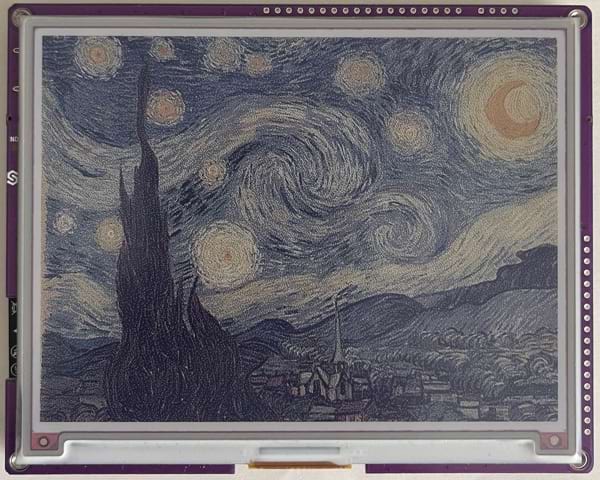3 releases (breaking)
| 0.3.0 | Jan 27, 2024 |
|---|---|
| 0.2.0 | Jan 25, 2024 |
| 0.1.0 | Jan 24, 2024 |
#2092 in Embedded development
1MB
764 lines
AB1024-EGA (AC057TC1)
An embedded-hal SPI driver for AB1024-EGA/AC057TC1 (as used in Inkplate 6
COLOR).
AFAIK there is no way to send partial updates to AB1024-EGA/AC057TC1. Thus, this driver allocates a ~130kb buffer for pixel data. Included examples assume Inkplate 6 COLOR but the driver itself should be usable with AB1024-EGA/AC057TC1 displays connected to other hardware. This driver is heavily based on the Soldered Inkplate Arduino library, hence the LGPL 3 license.

Running
I've tried to strike a balance between making tests and examples easy to run
even though these run in very different environments. This is why the esp
toolchain necessary for examples is not selected for you automatically by a
rust-toolchain.toml. It must be selected manually (assuming it is not the
system default).
To run examples:
cargo +esp re $EXAMPLE_NAME
To run tests:
cargo test --tests
Setting up esp32 environment
An esp32 environment is needed to run the Inkplate examples on Inkplate hardware. The specific architecture used on Inkplate 6 COLOR is not RISC-V but Xtensa. There are instructions for setting up an Xtensa Rust development environment at https://esp-rs.github.io/. At time of writing the main steps can be summarised as:
- Install espup
cargo install espup - Get espup to do environment setup
espup install - Source environment init file on non-Windows OS.
. $HOME/export-esp.sh